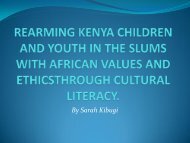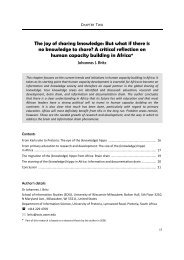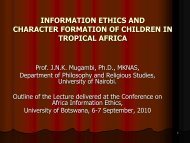Ethical Dimensions of the <strong>Information</strong> Scoiety: Implications for <strong>Africa</strong>guarantees of freedom of speech and association.The annual WSIS forum established to monitor progress be<strong>in</strong>g made <strong>in</strong> the context of ActionL<strong>in</strong>es (of the plan of Action) provides a framework for exam<strong>in</strong><strong>in</strong>g emerg<strong>in</strong>g issues of ICT use,<strong>in</strong>clud<strong>in</strong>g ethical aspects <strong>in</strong> the <strong>Information</strong> Society. This forum makes appropriate recommendationsfor action by national governments. For example, the May 18, 2011 WSIS forum on Cyber and<strong>Information</strong> <strong>Ethics</strong>: Freedom & Security, Privacy, Malice & Harm, Property (UNESCO & WSIS 2011)was convened as part of Action L<strong>in</strong>e C10 to provide the opportunity to <strong>in</strong>terrogate the ethicaldimension of social media, especially the design of <strong>in</strong>formation systems, which may impede thecreation of just, peaceful, <strong>in</strong>clusive societies and the full expression of human rights. Issues aroundtrust and the control of and use of personal data, particularly bio-data, were also exam<strong>in</strong>ed, as wasthe presence of new threats to human freedoms. The ethical dimensions of ICTs have also beenaddressed through Action L<strong>in</strong>e C3: Access-ICT and Persons with Disabilities; Action l<strong>in</strong>e C7: E-learn<strong>in</strong>g: Teachers Count; Action L<strong>in</strong>e C8: Indigenous peoples and education; and Action L<strong>in</strong>e C9:Media Regulation: Broadcasters and Social Media. Collectively, the efforts be<strong>in</strong>g made through theseAction L<strong>in</strong>es should by and large guarantee ethical and moral compliance by users while <strong>in</strong>teract<strong>in</strong>g <strong>in</strong>social media environments.Scholars and other stakeholders should debate and engage <strong>in</strong> open dialogue on the ethical andmoral issues <strong>in</strong> social media and develop appropriate <strong>in</strong>terventions. The Communication and MediaResearch Institute (CAMRI) (2012) po<strong>in</strong>ts out that the Arab Spr<strong>in</strong>g (earlier referred to) that culm<strong>in</strong>ated<strong>in</strong> the overthrow of repressive regimes <strong>in</strong> the region was catalysed by social media and brought to thefore manifestations of tension and struggle among governments, citizens and terrorists, which calls fordebates on social transformation <strong>in</strong> the context of new media and ICTs.Lundsay (2010) says that social media is a challeng<strong>in</strong>g topic because it crosses over so manyethics and compliance issues. However, like any other ethics and compliance topic, it can and mustbe proactively managed. UNESCO (2008) states that promot<strong>in</strong>g ethical aspects and pr<strong>in</strong>ciples thatespouse creative multil<strong>in</strong>gual content and universal access to <strong>in</strong>formation and communication shouldbe encouraged among users and service providers. Policies to enhance ethical values <strong>in</strong> social mediaenvironments should provide commitment to the free flow of <strong>in</strong>formation. The dialogue and debatesthat have been aroused by the <strong>Africa</strong>n Network for <strong>Information</strong> <strong>Ethics</strong> (ANIE), s<strong>in</strong>ce 2007, should beencouraged and supported.11. ConclusionThis chapter set out, through literature reviews and content analysis of social media user policies, todiscuss issues and debates around the responsible use of ICTS <strong>in</strong> the <strong>Information</strong> Society, asenunciated by the World Summit on <strong>Information</strong> Society Action L<strong>in</strong>e C10. The emphasis was placedon social media because it is the latest powerful onl<strong>in</strong>e activity that results from the convergence ofvarious technologies, especially the Internet, the computer and mobile phones. Four aspects wereaddressed <strong>in</strong> this chapter, namely 1) responsible use of ICTs <strong>in</strong> the <strong>Information</strong> Society; 2) socialmedia contributions to the <strong>Information</strong> Society; 3) ethics and social media and 4) the ethicaldimension of the <strong>Information</strong> Society. The chapter generally asserted that the laggard technologicaladoption behaviour that characterised <strong>Africa</strong> and its people for many years is gradually giv<strong>in</strong>g way <strong>in</strong>the wake of new technologies epitomised by social media. The chapter demonstrated that socialmedia has ga<strong>in</strong>ed acceptance and use <strong>in</strong> education, research, bus<strong>in</strong>ess, government, politics,professional practice, and <strong>in</strong> the general society, thus rais<strong>in</strong>g several ethical issues such as protectionof users’ rights, user privacy guarantees, methods of enforc<strong>in</strong>g compliance with the policies, usercompensation when rights are violated, sanctions for errant users, verification of the credibility of<strong>in</strong>formation uploaded by users, role and responsibilities of users, cybercrime, user tra<strong>in</strong><strong>in</strong>g, and more.Page 39
S.M. MutulaIt was found that cultural practices <strong>in</strong> <strong>Africa</strong> form part of the daily norms of the people and ethicalissues <strong>in</strong> the use of new technologies needed to be debated while tak<strong>in</strong>g cognisance of this fact.The chapter established that <strong>Africa</strong> does not seem to have any clearly documented ethical and moraltraditions. Consequently, <strong>Africa</strong>n scholars are advocat<strong>in</strong>g an <strong>Africa</strong>n philosophy that will underp<strong>in</strong>ethical behaviour <strong>in</strong> an <strong>Information</strong> Society. The chapter proposed multipronged approaches toaddress ethical issues <strong>in</strong> the <strong>Information</strong> Society such as government provid<strong>in</strong>g an enabl<strong>in</strong>g policyand legal environment for deal<strong>in</strong>g with ethical breaches; tra<strong>in</strong><strong>in</strong>g of users on the responsible use ofICT by service providers; the use of more enhanced technological tools to make the Internet a safeand secure place; effective and rigorous monitor<strong>in</strong>g of onl<strong>in</strong>e behaviour by service providers, etc.ReferencesArico, J. (2011). Hackers Threaten to Take Down Facebook. Retrieved March 26, 2012 fromhttp://www.mobiledia.com/news/115338.html.Brey, P. (2008). Do we Have Moral Duties Towards <strong>Information</strong> Objects? In <strong>Ethics</strong> and <strong>Information</strong>Technology, Vol. 10, 109-114.Capurro, R. (2008). Intercultural <strong>Information</strong> <strong>Ethics</strong>: Foundations and Applications. In Journal of<strong>Information</strong>, Communication & <strong>Ethics</strong> <strong>in</strong> Society, Vol. 6. (2), 116-120.Capurro, R. (2010). Global Intercultural <strong>Information</strong> <strong>Ethics</strong> from an <strong>Africa</strong>n Perspective. Keynote Addressfor the Second <strong>Africa</strong>n <strong>Information</strong> <strong>Ethics</strong> Conference, September 6-7, 2010, Gaborone, Botswana.Carbo, T. (2007). <strong>Information</strong> Rights: Trust and Human Dignity <strong>in</strong> E-government. In International Review of<strong>Information</strong> <strong>Ethics</strong>, Vol. 7, (9). Retrieved December 8, 2008, from http://www.i-r-i-e.net.Carbo, T. (n.d.). Understand<strong>in</strong>g <strong>Information</strong> <strong>Ethics</strong> & Policy: Integrat<strong>in</strong>g Ethical Reflection and Criticalth<strong>in</strong>k<strong>in</strong>g <strong>in</strong>to Policy Development. Pittsburgh. University of Pittsburgh.Chauke, G. (2012). South <strong>Africa</strong>: The Power of Social Media <strong>in</strong> Education. Retrieved March 27, 2012, fromhttp:// allafrica.com/stories/201203130926.html.Chuang, C. & Chen. J.C. (1999). Issues <strong>in</strong> <strong>Information</strong> <strong>Ethics</strong> and Educational Policies for the Com<strong>in</strong>g Age.In Journal of Industrial Technology, Vol. 15, (4), 1-6.Communication and Media Research Institute (CAMRI). (2012). ICTs, New Media and Social Change <strong>in</strong><strong>Africa</strong>, Conference organised by the <strong>Africa</strong> Media Centre. Retrieved March 28, 2012, fromhttp://www.westm<strong>in</strong>ster.ac.uk/ research/a-z/africa-media-centre/events/events-calendar/2012/icts-newmedia-and-social-change-<strong>in</strong>-africa.Conway, P. (n.d.). <strong>Ethics</strong>, <strong>Information</strong> Technology and Today’s Undergraduate Classroom. Michigan:University of Michigan.Corbet, P. (2010). Facebook Demographics and Statistics Report 2010: 145% Growth <strong>in</strong> 1 year. [Onl<strong>in</strong>e].Retrieved April 3, 2012 from http://istrategylabs.com/2010/01/facebook-demographics-and-statisticsreport-2010-145-growth-<strong>in</strong>-1-year/.Cox, J. (2004). E-books: Challenges and Opportunities. D-Lib Magaz<strong>in</strong>e, 10(10). Retrieved December 30,2012 from http://www.dlib.org/dlib/october04/cox/10cox.html.Daily Nation. (2012). Cellphone Giv<strong>in</strong>g Away Your Personal Privacy. In Daily Nation, February 19, 2012.Dirks, K.T. & Ferr<strong>in</strong>, D.L. (2002). Trust <strong>in</strong> Leadership: Meta-Analytic F<strong>in</strong>d<strong>in</strong>gs and Implications for Researchand Practice. In Journal of Applied Psychology, Vol. 87. (4), 611-628.eBizMBA. (2011). Top 15 Most Popular Social Network<strong>in</strong>g Websites. Retrieved April 3, 2012 fromhttp://www.ebizmba.com/articles/social-network<strong>in</strong>g-websites.Easton, D. (1965). A Systems Analysis of Political Life. New York, John Wiley.Facebook. (2012). Statement of Rights and Responsibilities. Retrieved March 29, 2012 fromhttps://www.facebook.com/legal/termsFallis, D. (2007). <strong>Information</strong> <strong>Ethics</strong> for the Twenty-First Century Library Professionals. In Library Hi Tech,Vol. 25, (1), 23-36.Farm<strong>in</strong>gton, C. (2012). Social Media Boom and Rise of Affordable Handsets to Double Mobile BroadbandMarket Revenue <strong>in</strong> West and Central <strong>Africa</strong> by 2017. Retrieved March 17, 2012 fromhttp://f<strong>in</strong>ance.yahoo.com/news/social-media-boom-rise-affordable-180000289.html.Floridi, L. (1999). <strong>Information</strong> <strong>Ethics</strong>: On the Theoretical Foundations of Computer <strong>Ethics</strong>. In <strong>Ethics</strong> &<strong>Information</strong> Technology. Vol. 1, (1), 37-56.Google. (2012). User Content and Conduct Policy. Retrieved March 29, 2012 fromhttp://www.google.com/<strong>in</strong>tl/en/+/policy/ content.html.Gordana, D.C. & Hofkirchner, W. (2011). Floridi’s Open Problems <strong>in</strong> Philosophy of <strong>Information</strong>, Ten YearsLater. In <strong>Information</strong>. Vol. 2. 327-359.Page 40
- Page 1 and 2: Information Ethics in Africa: Cross
- Page 4: Information Ethics in Africa:Cross-
- Page 7 and 8: Page ii
- Page 9 and 10: Page iv
- Page 11 and 12: About the AuthorsDennis N. Ocholla
- Page 13 and 14: J.J. Britzmeaning of the ethical co
- Page 15 and 16: J.J. Britzright is not only on the
- Page 17 and 18: J.J. BritzFreeman, C. & Louca, F. (
- Page 19 and 20: R. Capurroprotection should be acco
- Page 21 and 22: R. Capurroindustrial and military a
- Page 23 and 24: R. Capurrocommon world instead of m
- Page 25 and 26: R. Capurroterminology (Wiredu, 1995
- Page 27 and 28: R. CapurroICT in Africa includes al
- Page 29 and 30: R. CapurroBuchmann, J. (Ed.) (2012)
- Page 31 and 32: R. CapurroRoosevelt, E. (1958). In
- Page 33 and 34: D.N. Ochollatheoretical views on th
- Page 35 and 36: D.N. Ochollaof GDP per capita are (
- Page 37 and 38: D.N. Ochollaassociate IK with tradi
- Page 39 and 40: D.N. Ochollafulfil the ideals as sp
- Page 41 and 42: S.M. MutulaBy definition, Informati
- Page 43 and 44: S.M. Mutulasurpassing countries in
- Page 45 and 46: S.M. MutulaThe University of Manito
- Page 47 and 48: S.M. Mutula8. Gaps in social media
- Page 49: S.M. Mutulaadhering to policies and
- Page 53 and 54: S.M. MutulaVelasquez, M., Andre, C.
- Page 55 and 56: D. KawooyaLikewise, the laws and re
- Page 57 and 58: D. Kawooya107) but slowly making it
- Page 59 and 60: D. Kawooya4. IP in Africa and ethic
- Page 61 and 62: D. Kawooyawrongdoing because of the
- Page 63 and 64: D. Kawooyapractices. Countries that
- Page 65 and 66: D. KawooyaOf course, at the core of
- Page 67 and 68: D. Kawooyanumber of information acc
- Page 69 and 70: Page 58
- Page 71 and 72: S.M. Mutulaparties and civil societ
- Page 73 and 74: S.M. Mutulaadoption of the principl
- Page 75 and 76: S.M. Mutulaset of 17 barriers for e
- Page 77 and 78: S.M. Mutulaavailing tender document
- Page 79 and 80: S.M. MutulaReferencesAkther, M.S.,
- Page 81 and 82: Page 70
- Page 83 and 84: J.J. Britzalso to benefit from it t
- Page 85 and 86: J.J. Britzthe public sphere, which
- Page 87 and 88: J.J. Britzinfrastructure, developme
- Page 89 and 90: J.J. Britz6.2. Qualitative indicato
- Page 91 and 92: J.J. BritzSen, A. (1993). Capabilit
- Page 93 and 94: IndexCapurro 1, 3, 4, 7, 11, 12, 21
- Page 95 and 96: IndexFFacebook 30, 33fairness 2femi
- Page 97 and 98: IndexITU World Telecommunication 27
- Page 99 and 100: Indexrecognition algorithms 11recon
- Page 101:
IndexYYoruba 49YouTube 30ZZimbabwe






